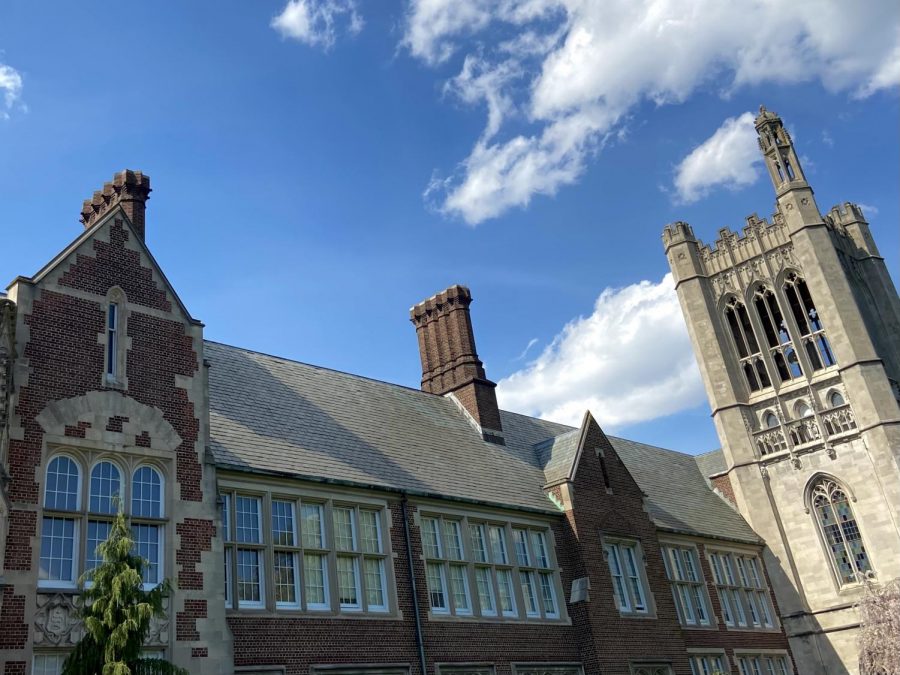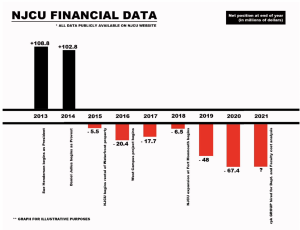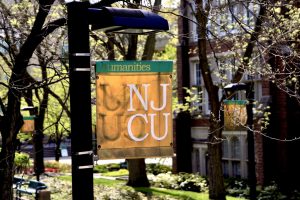President’s Leadership in Question
What to Expect at the September Senate Meeting
Hepburn Hall, the administrative building at NJCU. Photo by Haresh Oudhnarine.
September 24, 2021
At Monday’s University Senate meeting, some faculty are expecting to have a vote of no confidence against president Sue Henderson. The motion is being revisited from the May meeting.
Throughout the summer, the faculty group that put together the no-confidence motion said they have done extensive research into the university; looking into the information available on the NJCU website and requesting documents through the Open Public Records Act.
They created a list of 12 reasons to vote “yes” to the no-confidence motion which was sent out to members of the American Federation of Teachers (AFT) Local 1829 union. They say as a group they represent 175 years of service to the university.
They claim that a major deciding factor is that the university is in “extreme financial peril.” Other reasons include, they say, that the administration has made major decisions without consulting faculty (shared governance), given out expensive contracts to the developers of the West Campus and Fort Monmouth projects, the change in the COVID policy, a lawsuit against NJCU from the former A. Harry Moore principal for wrongful termination, and more.
Earlier this year, NJCU hired a consulting firm called rpk GROUP for over $300,000 to study the school’s “academic efficiencies and administrative services.”
Anne Mabry, a professor for English as a Second Language, pointed out the hiring of rpk may have been the tipping point for most faculty members. She also said, “A healthy institution embraces shared governance, where different points of view of the stakeholders are considered in the decision-making process. Shared governance has been particularly thwarted under Sue Henderson. She is completely top-down in her management style. Just look at her vaccination policy this Fall. No one was consulted when she dropped the August 18 mandate.”
Andres Acebo, the chief of staff to president Henderson, said that the administration met with the AFT president, Barbra Hildner, multiple times during the summer to discuss the vaccine mandate in good faith and that both sides were open to having those conversations.
Acebo said in an interview, “As a general matter, the Administration explicitly takes issue with the characterization of the claims.” He said that a lot of claims are only addressing the surface of real issues. That there is information being left out, such as with the full picture of the university’s financial status and with the background to the decisions of the COVID vaccination policy. He explained that there have been many interactions between faculty and the university’s chief financial officer in addition to town halls where the institution’s financial situation has been explained.
Acebo said, “I don’t disregard the legitimacy of their concerns. I think their concerns are misplaced, and the blame is misplaced.”
Previewing the Meeting’s Agenda
Before the vote of no confidence resolution, Henderson will give an update on NJCU. After, there will be a COVID update from the vice president for Student Affairs, Jodi Bailey, and Acebo. There will also be an update on the rpk study from faculty and staff.
Fran Moran, the president of the University Senate and chairperson for the Political Science department, said, “Procedurally, the [no-confidence] motion was introduced on the Senate floor in May. It wasn’t reviewed by any of the senate committees. Even though the Senate will be taking it up, it doesn’t have the official backing of any senate committees, including the execs [executive senate committee]. Everyone saw it for the first time when it came to the floor.”
One other professor who did not want to give their name spoke to The Gothic Times and also said that the motion could have been introduced better.
According to Moran, the meeting will take place on Zoom, and there have been guidelines sent out to all senators on how long they will each be able to speak.
Regarding the motion for a vote of no confidence, Moran said, “I think the meeting is going to be lively, the debate. I think it is going to be emotional for everybody. This is not easy for the administration. I know the folks who are bringing the motion care very passionately about the university. Both sides do.”
Understanding What’s Going On
Moran explained that students should go to their student senators to represent their interests. There is a student senator for each class and representatives from the Student Government Association (SGA).
“One thing I think is important is for students to get information from both sides.” Moran points to the university’s “Rankings and Fast Facts” page and also said, “If she’s [Henderson] going to get the blame for the negatives, she also has to get some credit for those positives. Our graduation rates, for instance, are up.”
Acebo pointed out that NJCU is ranked number one in New Jersey by the US News & World Report for social mobility, and is in the top 25 for the country. NJCU also ranks number 4 in social mobility by CollegeNET.
Mabry elaborated on why the rpk study was a tipping point for some faculty members. She said, “When we looked into all the other institutions that rpk had done an efficiency study on, cuts were part of the outcome.”
Mabry said that the university is not transparent about its debt and that student voices are not being heard, echoing SGA president, Thyquel Halley’s remarks at the June Board of Trustees meeting. At that time, Halley said that the university should expand on student services when there is a tuition increase.
Acebo said that the Garden State Guarantee (GSG) program from the state of New Jersey will be of great assistance to the university. He explained that NJCU was a leader of public institutions in the state for its debt-free promise program which helps students whose family income is under $65,000. The GSG is helpful since the state will give NJCU money that usually comes out of the school’s own finances.
What is a Vote of No Confidence?
A vote of no confidence is when a group no longer believes that an administrative member is doing what is best for the university. In NJCU’s case, faculty and staff have to pass a vote through the University Senate in order to vote against Henderson’s leadership.
The motion for a vote of no confidence for Henderson was drafted by a group of faculty. It states that in the event of a resolution, the Senate will welcome in a new president that the Board of Trustees will appoint after a national search.
Kean University had a vote of no confidence in 2010 for its president at the time, Dawood Farahi. They cited “fiscal and academic mismanagement,” the elimination of popular programs, a 44:1 student to faculty ratio, and many other decisions. In 2012, 94 percent of faculty at Kean University voted for having no confidence in the institution’s Board of Trustees. Despite all of this, the school’s Board of Trustees renewed Farahi’s contract for an additional three years in 2017.
In 2017, faculty from William Paterson University (WPU) had a vote of no confidence against the president at the time, Kathleen Waldron. A report from Inside Higher Education explained that the vote was more of a call to action for Waldron to make better decisions as an administrator and to be a better listener for the faculty at WPU. A year after that vote, Waldron resigned citing her age.














